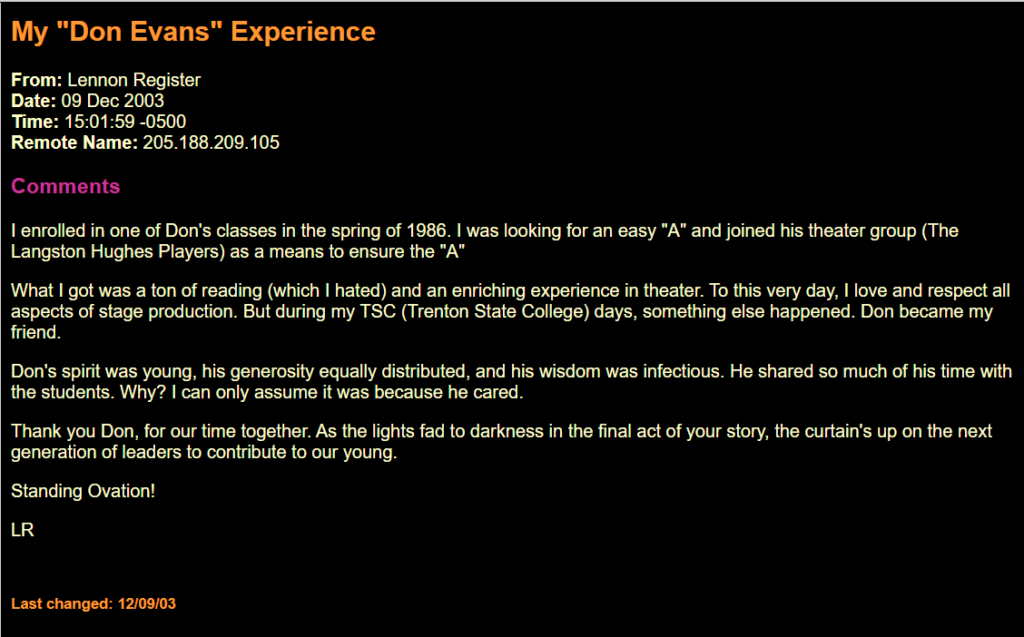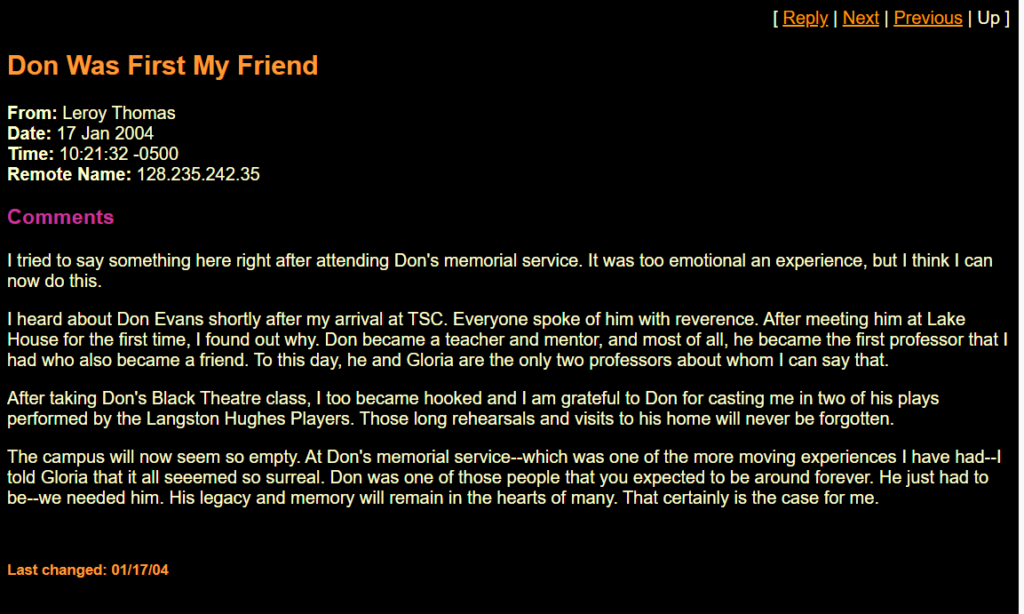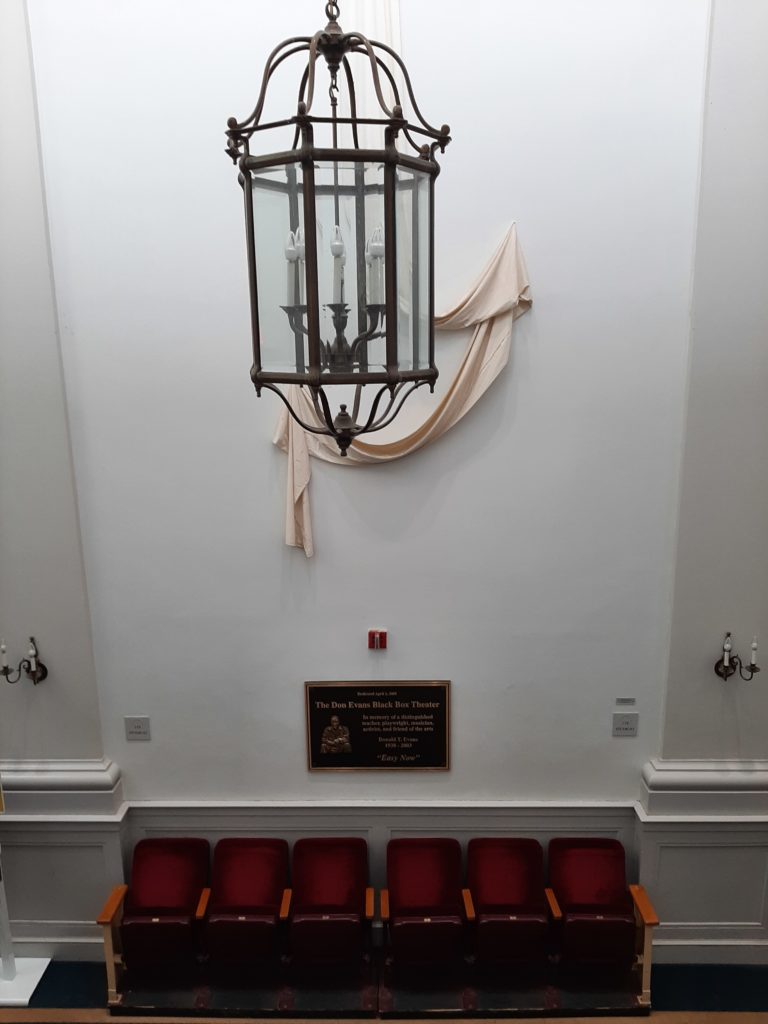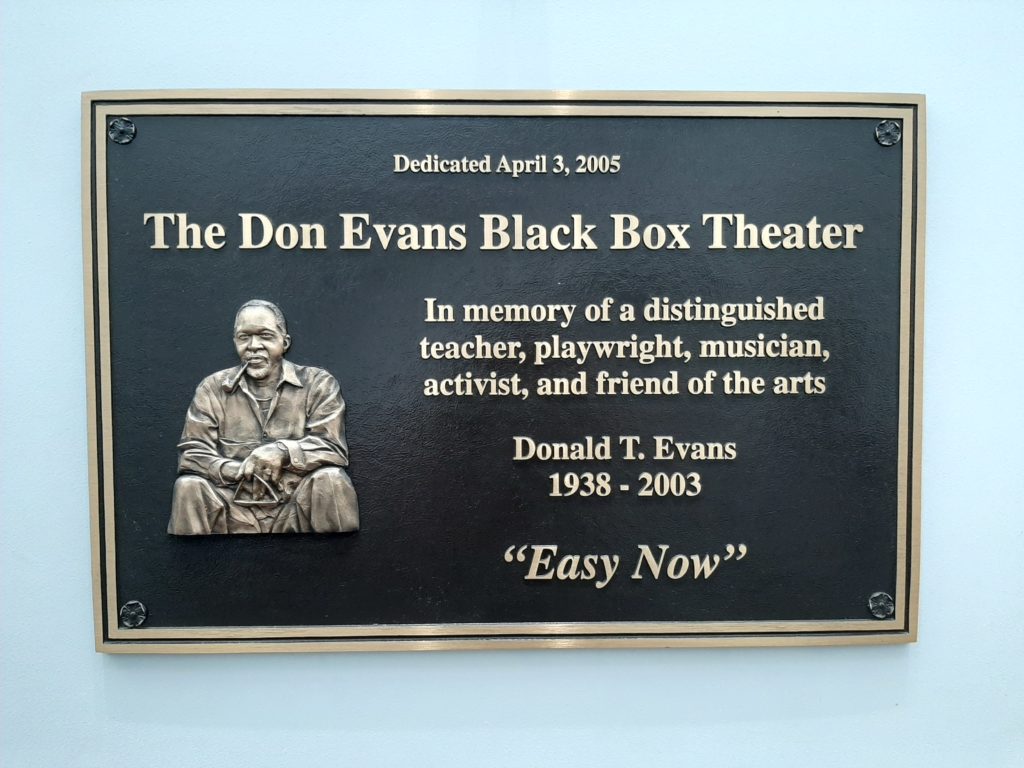When someone passes away, it can be difficult to come up with a lasting memorial tribute that will adequately recognize all of their achievements. For Professor Donald T. Evans, one of the founding members of the African American Studies Department at TCNJ and a prominent figure in the world of Black theater, finding a way to create an appropriate memorial for him on campus involved acknowledging both his excellence as a professor and his excellence as a playwright.
“He was a brilliant man, funny as can be, personable as can be, a great lover of the arts, with a real sense of social awareness, and someone who didn’t believe the Black arts was something you should study; It was something you should live,” said Professor Christopher Fisher, speaking of Evans.
Fisher was the Chair of the African American Studies Department at the time of Evans’ passing and had regularly worked with him for years.
Evans first came to TCNJ in 1972, when it was still called Trenton State College. He helped pioneer the African American Studies Department at TCNJ soon after, in an era when many African American studies departments were first starting to form across the country.
“His passing left an incredible void in the department,” said Fisher.
Though she did not have the opportunity to know him for long, former TCNJ president R. Barbara Gitenstein said that Evans made a strong impression on her. When she first came to the college in 1999, he was one of the faculty members she made a point to consult with early on, while she was still figuring out the kind of president she wanted to be and acclimating to TCNJ’s environment.
Gitenstein knew about the significance of Evans’ work at TCNJ, but it was not until she was reading more about his career to prepare remarks for his memorial service that she realized how prominent a figure Evans was in the Black Arts Movement.
“One of things that struck me was the fact that I didn’t know this stuff about him, and that was vintage Don Evans, he was more interested in getting stuff done than being celebrated” said Gitenstein.
A committee dedicated to organizing a tribute to Evans formed on campus, and they approached Gitenstein with their ideas for a memorial. One of their first considerations was to name something on campus after him, and an ideal place soon became apparent. There was a performance space at the back of Kendall Hall that was then just called the Black Box Theater.
“When people came to me to talk about an appropriate tribute to Don, that I remember very well, it was just such a perfect choice that the black box should be named for him,” said Gitenstein.
The Black Box Theater was an ideal location for two reasons. First, naming a theater after Don Evans would serve as an acknowledgement of his contributions to the world of theater. Second, the building the theater was housed in, Kendall Hall, also held significance to TCNJ’s African American Studies Department and to Evans. For many years, the department, and Evans’ office, were housed on the second floor of Kendall Hall.
The committee seeking to create a tribute to Evans organized a benefit performance called “Easy Now: An Evening at Don’s Spot” which was held at Kendall Hall on Feb. 27, 2004. Proceeds from the performance went towards the beginnings of the Donald T. Evans Memorial Endowment as well as a plaque to place outside the newly christened Don Evans Black Box Theater. Evans’ children and TCNJ alumni came together to perform excerpts from his plays.
Many students who were part of Evans’ campus theater group, the Langston Hughes Players, felt he was a great friend and mentor, and left written tributes on a memorial site dedicated to him. When some of these alumni came back to campus to perform at “Easy Now: An Evening at Don’s Spot,” they called their group the Don Evans Langston Hughes Players.


“Don was a magnetic personality. Smart, funny, cool. To me, he embodied that fusion of jazz and the blues, because he was so cool and mellow,” said Fisher. “There was an instant wisdom that you just sensed when you were around him.”
In the foyer of the Don Evans Black Box Theater, at the back of Kendall Hall, the plaque dedicating the theater to Evans reads, “In memory of a distinguished teacher, playwright, musician, activist, and friends of the arts.”
Though the organizers of “Easy Now: An Evening at Don’s Spot” originally intended to make performances of Evan’s work an annual event on campus, these plans fell through, and the effects of the 2008 Financial Crisis further complicated future plans for performances of Evans’ plays.
“It’s impossible to describe how destabilizing the stock market crash was between 2008 and 2009,” said Fisher. “There was a point when TCNJ was facing existential questions about whether it was going to exist as an institution . . . in that environment, everything was cut.”
Fisher would like to see the committee’s original plan to hold regular performances of Evans’ plays on campus revived. He believes featuring Evans’ work is something the college should make a priority, though he acknowledges the only reason that this may not be the case is that the current administration is not aware of the significance of Evans’ contributions to the world of theater.
“It would be great if students at TCNJ excavated the idea of the Don Evans Langston Hughes Players and demanded space in the black box to do a play related to African Americans or people of color,” said Fisher. “For students to do plays that are outside the canon of what’s accepted in theater, and do it every year.”
Evans’ later reflections on his work speak to its timelessness. In a recorded interview conducted by Professor Lincoln Konkle, Evans spoke about the way he saw his plays possess an enduring appeal to their audiences.
“I did a residency at the State University of New York, we did the very first commercially produced play that I ever wrote,” said Evans. “It was wild, folks were laughing and rolling in the aisles and I was thinking, damn I wrote this thing in ‘74. And that’s cool that the plays do that.”

